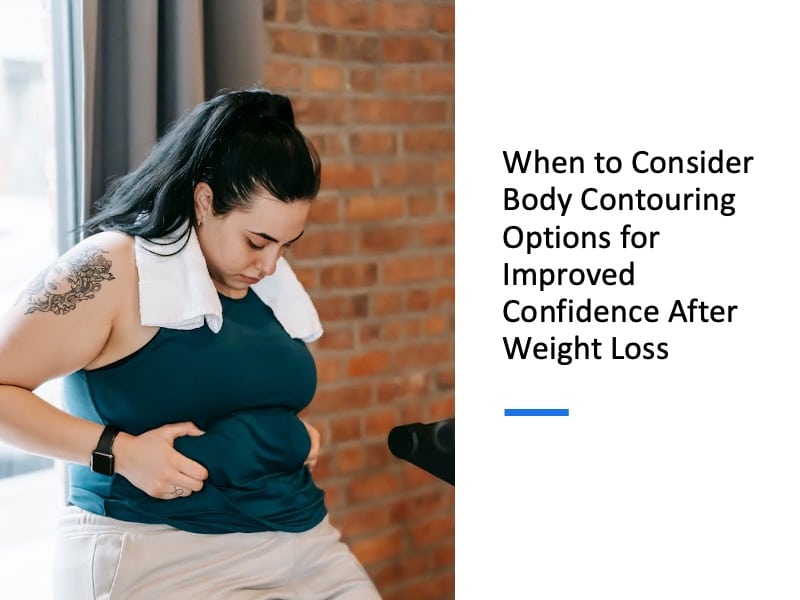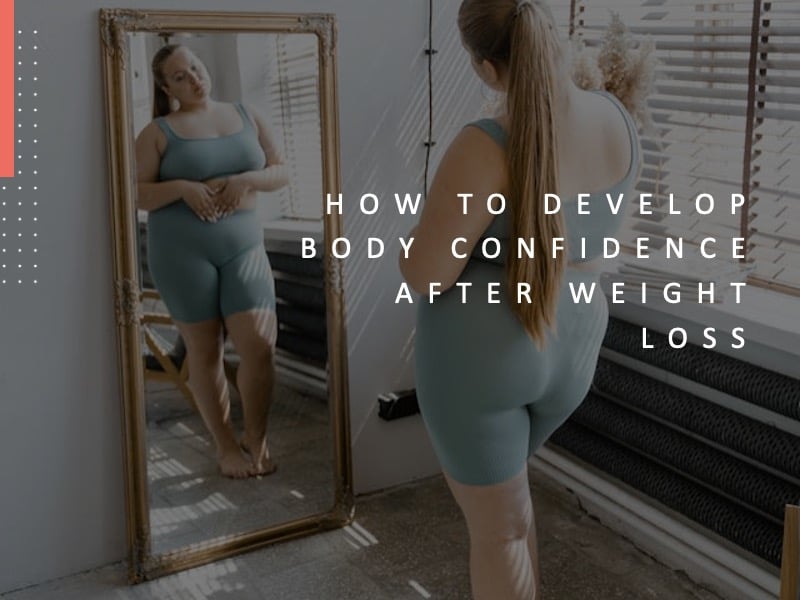How to Develop Body Confidence After Weight Loss
Losing weight is an incredible achievement that requires dedication, consistency, and significant lifestyle changes. While achieving your goal weight is a moment to celebrate, adjusting to your new body can present unexpected emotional and physical challenges.
Many people struggle with body confidence after weight loss, particularly when faced with loose skin, stretch marks, or changes in body proportions.
These physical changes are normal but can affect how you feel about your new body. For some, these changes can even impact self-confidence and daily comfort.
While many people embrace these changes as badges of their journey, others choose to explore options like plastic surgery to address excess skin and complete their transformation.
Understanding how to embrace your post-weight loss body can help you develop a positive self-image and fully appreciate the hard work you’ve put into transforming your health.
Whether you choose to embrace these changes naturally or consider body contouring procedures, feeling comfortable in your skin is the ultimate goal.
Understanding Body Changes After Weight Loss
When you lose a significant amount of weight, your skin may not always adjust immediately.
This happens because skin stretches over time due to weight gain, and factors such as age, genetics, and the amount of weight lost determine how well it bounces back.
While some people embrace these changes as a testament to their weight loss journey, others may find that excess skin causes discomfort or self-consciousness.
Studies indicate that over to 60% of people who experience significant weight loss consider some form of body contouring surgery to address excess skin (Monpellier et al., 2019).
Factors That Affect Skin Elasticity
- Age – Older skin has less collagen and elasticity.
- Duration of Excess Weight – The longer the skin is stretched, the harder it is to retract.
- Amount of Weight Lost – Rapid or extreme weight loss often results in more excess skin.
- Genetics – Plays a key role in skin elasticity and collagen production.
- Sun Damage – UV exposure can weaken skin elasticity.
- Smoking History – Smoking reduces collagen production and skin elasticity.
Common Areas Affected by Loose Skin
| Body Area | Common Issues |
|---|---|
| Abdomen | Loose skin, stretch marks, skin folds |
| Arms | “Bat wings” or sagging skin |
| Thighs | Inner thigh skin laxity |
| Face & Neck | Sagging jowls, loose neck skin |
| Breasts | Deflation, sagging |
Ways to Develop Body Confidence After Weight Loss
Building body confidence after weight loss goes beyond physical changes—it’s about embracing your new self.
- Focus on self-care by wearing clothes that make you feel good.
- Practice positive self-talk and celebrate non-scale victories like improved strength or energy.
- Engaging in strength training or mobility workouts can help you feel more connected to your body.
- Therapy or support groups provide emotional encouragement.
- Surround yourself with uplifting people, and remember that confidence grows from appreciating your journey, not just the end result.
When to Consider Body Contouring Options for Improved Confidence After Weight Loss

If excess skin is affecting your self-confidence or physical comfort, plastic surgery may be an option to consider.
However, timing matters, and most surgeons recommend the following:
- Maintaining a stable weight for at least 6-12 months before surgery.
- Being in overall good health with no major medical conditions.
- Ensuring proper nutrition and a balanced diet to support healing and recovery.
- Avoiding smoking, which can impair wound healing.
Common Reasons for Seeking Skin Removal Surgery
- Skin irritation and infections due to excess skin folds.
- Difficulty exercising because of movement restriction.
- Struggles with clothing fit due to excess skin.
- Body image concerns affecting confidence and mental well-being.
Many patients choose to visit specialized plastic surgery centers for post-weight loss procedures.
Resources like MDMarion.com offer guidance on procedures and help connect patients with experienced surgeons.
Common Procedures for Post-Weight Loss Body Contouring
If you decide to explore surgical options, here are some of the most common procedures:
Tummy Tuck (Abdominoplasty)
Removes excess abdominal skin and tightens the underlying muscles. Some weight loss patients may require an extended abdominoplasty to address excess skin on the lower back and sides.
Arm Lift (Brachioplasty)
Removes sagging skin from the upper arms, leaving a scar along the inner or back of the arm.
Thigh Lift
Addresses loose skin on the inner or outer thighs, or a circumferential lift for more extensive reshaping.
Breast Lift & Chest Contouring
- Women may require a breast lift or reduction to restore breast shape.
- Men may seek male chest contouring to remove sagging chest tissue.
Face and Neck Lift
Removes excess skin and tightens tissues to improve facial appearance after major weight loss.
Some patients opt for staged procedures, while others qualify for combined surgeries depending on their health status.
CoolSculpting
For those seeking non-surgical body contouring, CoolSculpting offers a safe, FDA-approved alternative that freezes and eliminates fat cells through cryolipolysis.
This treatment targets areas like the abdomen, thighs, arms, and double chin, reducing stubborn fat without downtime.
While effective for fat loss, CoolSculpting does not directly tighten loose skin, but can aid in the process.
Some people even try DIY CoolSculpting using ice packs or at-home coolsculpting machines, but results are inconsistent and risk skin damage.
While generally safe if done cautiously, professional coolsculpting treatments provide far better outcomes for fat reduction.
How to Prepare for Body Contouring After Signficiant Weight Loss
Undergoing body contouring after weight loss is a significant step that requires careful preparation.
Beyond the physical changes, ensuring your body is in optimal health can improve recovery and overall results.
From maintaining a stable weight to addressing nutritional needs and setting realistic expectations, thorough preparation can help you navigate the journey with confidence.
Health Requirements Before Surgery
- BMI below 30 (ideally below 28 for better recovery outcomes).
- Well-controlled medical conditions such as diabetes or hypertension.
- Healthy eating habits to support healing and recovery.
- No smoking for at least 4-6 weeks before surgery.
Setting Realistic Expectations
- Scars are inevitable but fade over time.
- Body contouring improves but does not perfect the body.
- Multiple procedures may be necessary for optimal results.
Financial Planning for Surgery
- Most insurance does not cover cosmetic procedures unless they cause medical issues.
- Some insurers may cover abdominal skin removal if it causes chronic infections.
- Explore financing or payment plans for affordability.
Recovery & Long-Term Results
Recovery varies by procedure, but here’s what to expect:
Short-Term Recovery (1-3 Weeks)
- Time off work: 1-3 weeks, depending on the procedure.
- Compression garments: Required for shaping and swelling control.
- Pain management: Medication may be prescribed.
Long-Term Healing (1-12 Months)
- Gradual return to exercise and normal activities.
- Scars will flatten and fade over time.
- Final results become visible after swelling subsides.
Scar Management Tips
- Use silicone sheets or gels to improve scar appearance.
- Keep scars out of direct sunlight to prevent darkening.
- Be patient—scars fade significantly within 6-12 months.
Most patients report high satisfaction after body contouring, with improved body confidence and comfort outweighing concerns about scars.
Beyond the Physical: Emotional Well-Being & Body Confidence
The emotional impact of post-weight loss surgery can be profound. Research indicates that individuals who undergo body contouring report:
- Improved body image and increased confidence.
- Greater physical comfort in clothing and activities.
- Reduced anxiety and distress related to excess skin.
However, some people experience identity shifts as they adjust to their new body.
It’s common to have mixed emotions, and support from counselors, support groups, or online communities can be helpful in navigating this transition.
Final Thoughts: Developing Body Confidence After Weight Loss
Whether you choose to undergo plastic surgery or not, the most important outcome is feeling comfortable and confident in the body you’ve worked hard to achieve.
Your weight loss success is valid with or without surgery—what matters most is your happiness and well-being.
If you’re considering body contouring, researching qualified professionals is crucial.
Above all, remember that body confidence after weight loss is a journey, not a destination.
Whether you are on your postpartum weight loss journey, lost a significant amount of weight for the first time, or simply made a transformative change after years of bad habits, regaining body confidence after weight loss isn’t easy.
Celebrate your transformation, focus on self-care, and embrace the healthiest, happiest version of yourself.
This website does not provide medical advice. This website site does contain affiliate links, and purchases may earn a commission.
Read my Medical Disclaimer, Review Disclaimer, and Publishing Policies for more details. Use of this site indicates acceptance of these terms.



